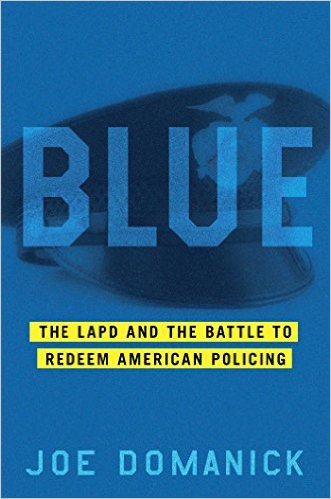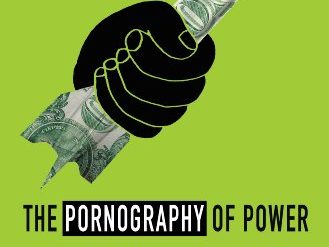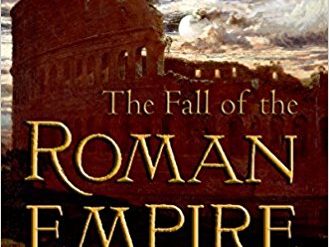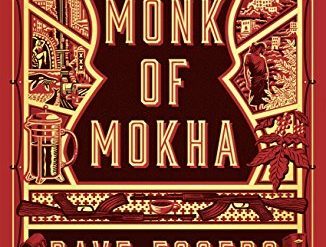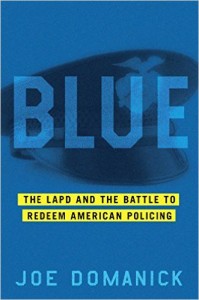
Despite the Serpico scandal that roiled the New York Police Department in the 1970s, despite all the tales about corruption in the Chicago Police and the low esteem in which all police have been held in the public mind for much of U.S. history, it’s likely that no police department in any large American city so richly deserved its reputation as brutal and corrupt as did the Los Angeles Police Department from the 1940s until the early years of the twenty-first century. This, after all, was the agency that provoked the horrific 1992 riots following the acquittal of four white police officers in the sadistic beating of Rodney King.
Estimated reading time: 4 minutes
In Blue, investigative reporter Joe Domanick focuses on the years following the 1992 riots as the city struggled to reform its police. As he so ably demonstrates, the police — from the rank and file all the way up through the command structure to the office of the chief — successfully resisted those efforts for a decade. Efforts by politicians and other outsiders were ineffectual, because in reality the police were left to police themselves. And that appears to have been the nub of the problem.
Blue: The LAPD and the Battle to Redeem American Policing by Joe Domanick ★★★★☆
The LAPD consent decree, Bill Bratton, and police reform
Only with the advent of the consent decree imposed on the city by a liberal federal judge, and the hiring of former New York Police Commissioner Bill Bratton as the new chief, did the advocates of reform finally gain traction. Now, more than a decade later, the most egregious abuses perpetrated by the department on the people of Los Angeles — most prominently, its black and brown people — are far less common. Domanick implies that police corruption is no longer endemic, there are far fewer murders and far less violent crime overall, and in most of the city the police are no longer viewed as a predatory occupying army. However, as he makes clear, the poverty, racism, and institutional inertia that were the ultimate causes of most of the abuse have by no means been eliminated.
Should police police themselves?
In Joe Domanick’s view, the heroes of the story are:
- Bratton and his hand-picked successor as chief, Charlie Beck;
- the Los Angeles Times reporters and editors who published more than 150 stories to highlight the notorious practices of the LAPD’s Rampart Division, which finally forced the department’s criminal misbehavior into the public’s awareness;
- the resourceful police captains and deputy chiefs nurtured and promoted by Bratton and Beck who engaged the community and reoriented the officers under their watch;
- Gary Alan Feess, the federal district judge who handed down and later renewed the consent decree;
- a reformer named Connie Rice, who spearheaded efforts to combat gang violence in a comprehensive way instead of answering violence with violence;
- and the grassroots gang interventionists, mostly former gang-bangers, trained by Rice and supported by the chief. Antonio Villaraigosa. As Mayor of Los Angeles from 2005 to 2013, he played a key role as a supporting actor in the drama, along with a handful of brilliant outsiders brought to L.A. by Bratton and slotted into strategic positions to revitalize the department.
Undoubtedly, the decades-long effort to reform the LAPD was successful, but only up to a point. In an epilogue, Domanick reflects on Bratton’s legacy and concludes that it is mixed: brilliant, but badly marred by the stop-and-frisk tactic that was central to the “broken windows” strategy he had first championed in New York . Tellingly, now that Bratton has returned as Commissioner of the NYPD under Mayor Bill de Blasio, he has cut back dramatically because it had come to be so badly overused.
Editorial flaws that get in the way
Blue helps throw light on the current debates about police conduct throughout the country. The book makes an important contribution. However, the publisher, Simon & Schuster, and the book’s editors, Karyn Marcus and Emily Graff, did a disservice to the author — and to all his readers — by failing to missing words and other editorial flaws scattered throughout the book. It’s a sad day when such a prestigious publisher should bring out a book filled with bonehead editorial mistakes. Where were the copyeditor and the proofreader when we needed them?
About the author
Joe Domanick is an award-winning investigative reporter, Associate Director of the Center of Media, Crime, and Justice of the John Jay College of Criminal Justice, and West Coast Bureau Chief of The Crime Report. He has been reporting on the LAPD for several decades.
For related reading
This is one of 6 books that explore our broken criminal justice system.
Like to read books about politics and current affairs? Check out Top 10 nonfiction books about politics.
If you enjoy reading nonfiction in general, you might also enjoy:
- Science explained in 10 excellent popular books
- Great biographies I’ve reviewed: my 10 favorites
- My 10 favorite books about business history
And you can always find my most popular reviews, and the most recent ones, on the Home Page.

